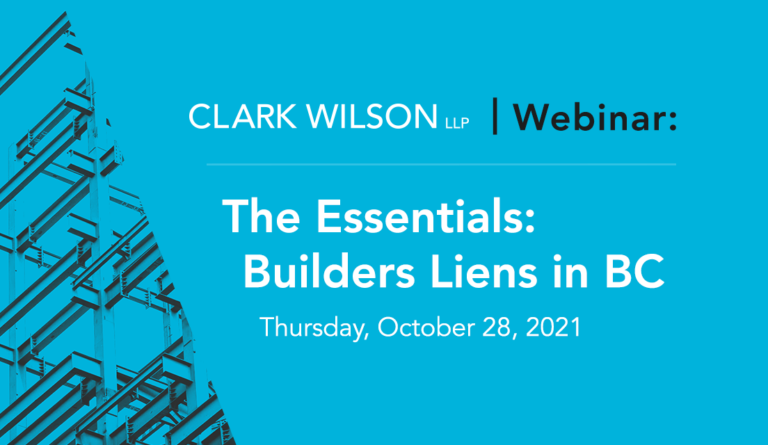
Cost-plus contracts require the owner to pay for the costs actually incurred for all labour, subcontracted services, materials and other costs of performing the construction work, plus a fee that is designed to (among other things) compensate the contractor’s time in managing and coordinating the work. A recent decision of the BC Court of Appeal, Highridge Homes Ltd. v. de Boer, 2023 BCCA 74, has clarified how certain clauses in cost-plus contracts will be treated. Specifically, clauses dealing with interest for unpaid amounts and the risk allocation of overages or extra costs above initial pricing estimates that are commonly incurred in cost-plus contracts.
Trial Decision
This case is the result of a dispute between Vanessa and Dirk de Boer, (the “Owner”), and Highridge homes Ltd., (“Highridge”), the contractor they engaged to build a home in Vernon, B.C. The contract between the parties was a cost-plus contract. The contract between the Owner and Highridge included a cost estimate for the work and also provided that interest of 12% per annum would apply to overdue amounts.
After construction commenced, the Owners and Highridge had a falling out over excavation costs. The Owners refused to pay the final invoice issued by Highridge, resulting in Highridge causing a claim of builders lien to be registered against the property. The lien was discharged by consent after the Owner’s posted security for the lien. Highridge subsequently commenced an action in the BC Supreme Court to perfect its builders lien and seeking damages for payment of the final invoice and lost profit. Included in Highridge’s claim was a claim for contractual interest on the final invoice from the date on which the Owner’s paid the security to discharge the lien. The Owners filed a counterclaim seeking to recover costs that they incurred in hiring a new contractor to take over construction.
Highridge was largely successful at trial. The trial judge found that the parties had mutually agreed to terminate the contract and ordered the Owners to pay most (though not all) of the costs invoiced by Highridge. The trial judge declined to order that the Owners pay contractual interest on the final invoice amount from the date that security was paid to discharge the lien.
Appeal
Highridge appealed the order that the Owners were not required to pay contractual interest. The Owner’s cross appealed on three issues: (i) whether the trial judge applied the correct law concerning the legal effect of a cost estimate incorporated into the contract; (ii) whether the trial judge correctly found that the contract had been mutually terminated; and (iii) whether the trial judge improperly refused to make certain deductions from the builders lien claim for work that the Owners said was not performed.
Highridge was successful in its appeal. The Court of Appeal found that Highridge was entitled to contractual interest of the unpaid invoice, finding that the payment of the security was not payment in satisfaction of the unpaid invoice and accordingly, contractual interest continued to accrue. As stated by the Court of Appeal – the fact that security was paid to discharge the lien does not mean that the funds were released to Highridge or that Highridge had control of the funds.
The Court of Appeal dismissed the cross-appeal. The Court of Appeal found that:
(i) the trial judge did not err when interpreting the impact of the cost estimate to the contract. The Court of Appeal found that there was no basis for concluding that the cost estimate altered the other contract terms, including those around price and price increases. Simply put, the fact that a cost estimate is included in a cost-plus contract does not alter the fact than an owner typically bears the risk of any cost overruns (as set out in the contract terms);
(ii) the trial judge did not err in finding that there was a mutual termination of the contract on the facts as presented, noting specifically that the alleged breaches of contract made by both parties did not amount to repudiation; and
(iii) the trial judge correctly assessed the costs included in the final invoice, and that the trial judge’s reasoning that just because no product or materials were received by the Owners did not mean that no costs were incurred did not contain errors.
Key Takeaways
Owners should take note of this decision as the Court of Appeal has made it clear that that payments made as security to discharge a builders lien will not limit any applicable contractual interest provision that may apply to late payments due under a construction contract. Depending on the rate of contractual interest that applies, this may result in a significant additional cost to an owner that is found to be responsible to pay an invoice issued under the construction contract, particularly when a construction dispute may take years to resolve. In this case, for example, Highridge was ultimately awarded contractual interest at a rate of 12% for a period of 56 months.
Owners and contractors should also take note that the Court of Appeal has confirmed that the inclusion of a cost estimate in the contract does not shift the risk of responsibility for cost overruns on any project. Owners and contractors should carefully review the terms of their contract to confirm what procedures are in place for change orders and authorization for extra costs. The contract terms should be followed and neither party should rely solely on a cost estimate as a means of controlling the price in a cost-plus contract.


